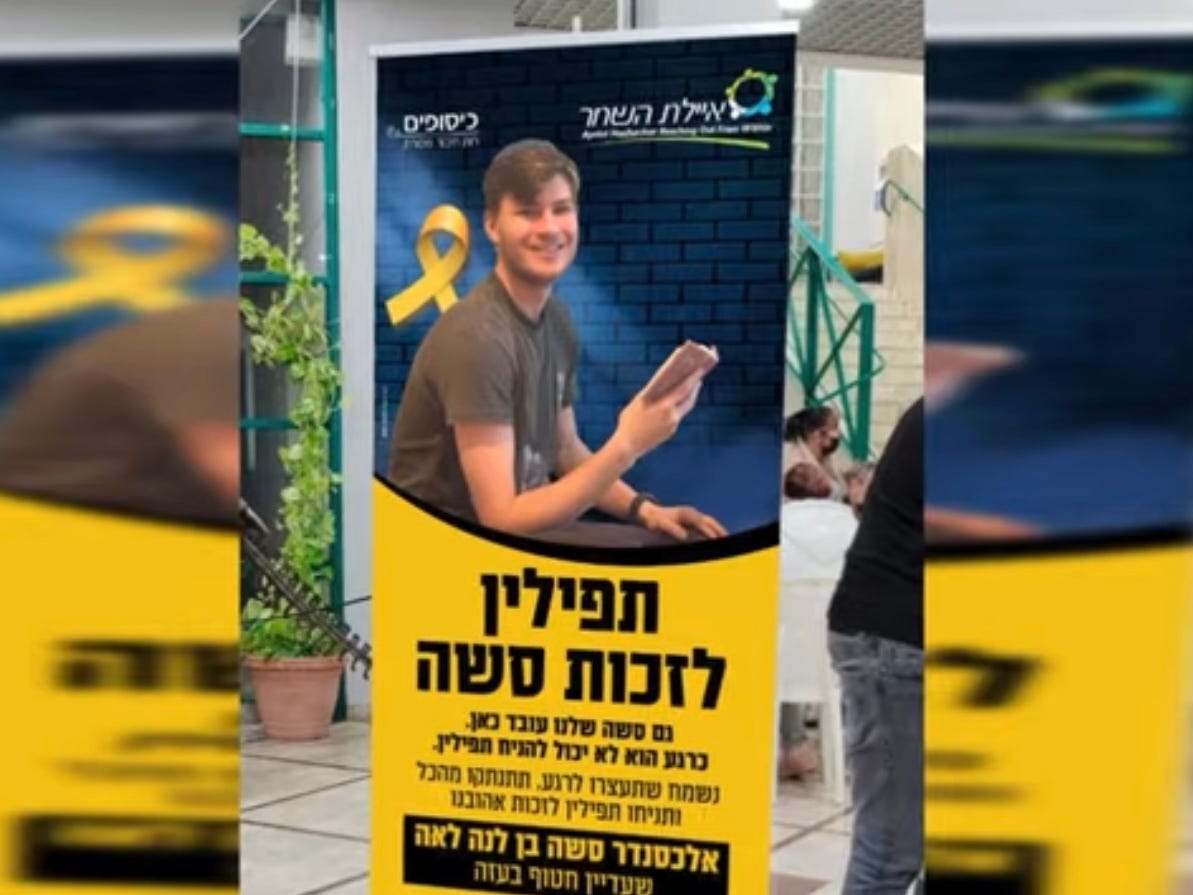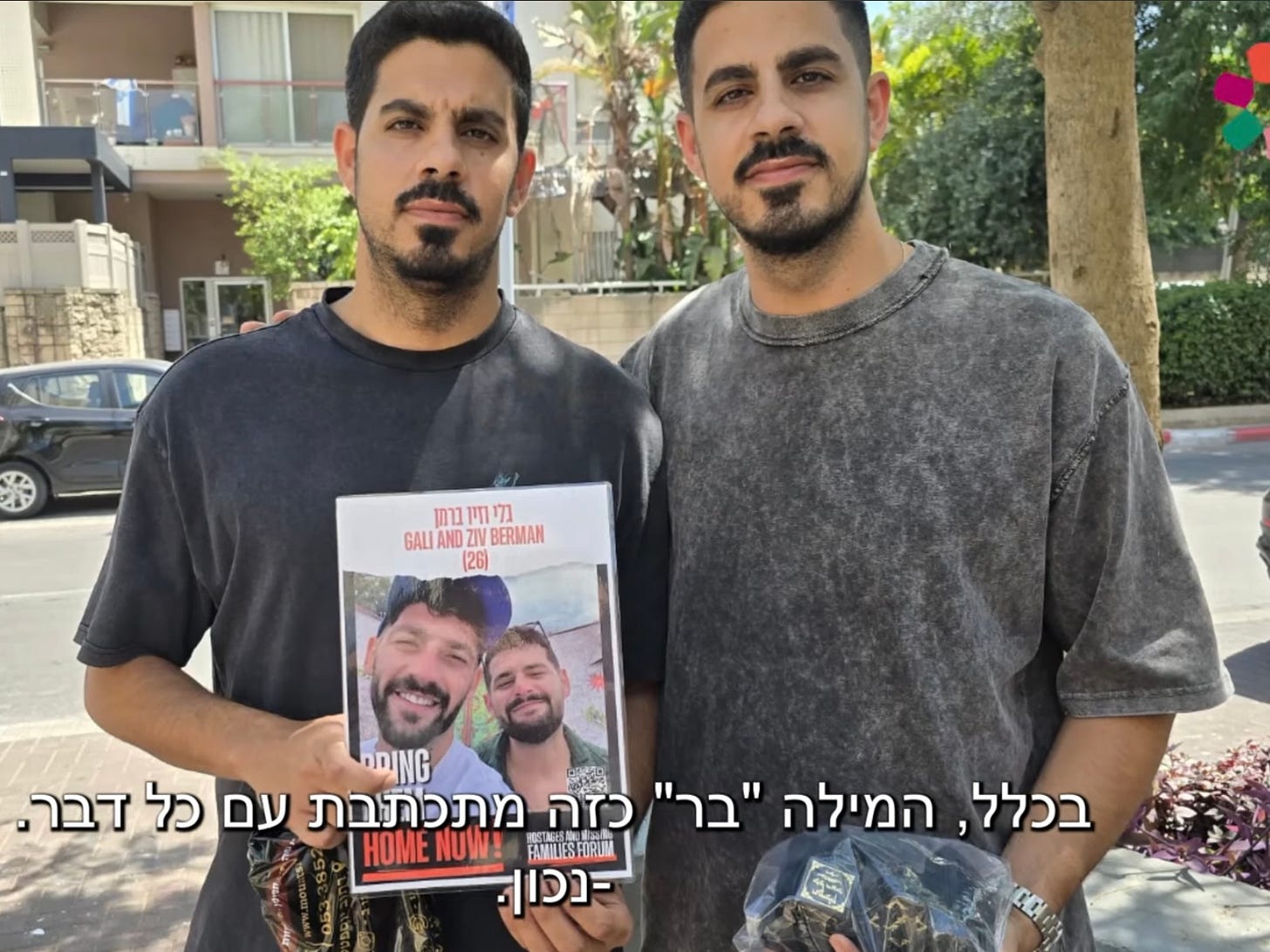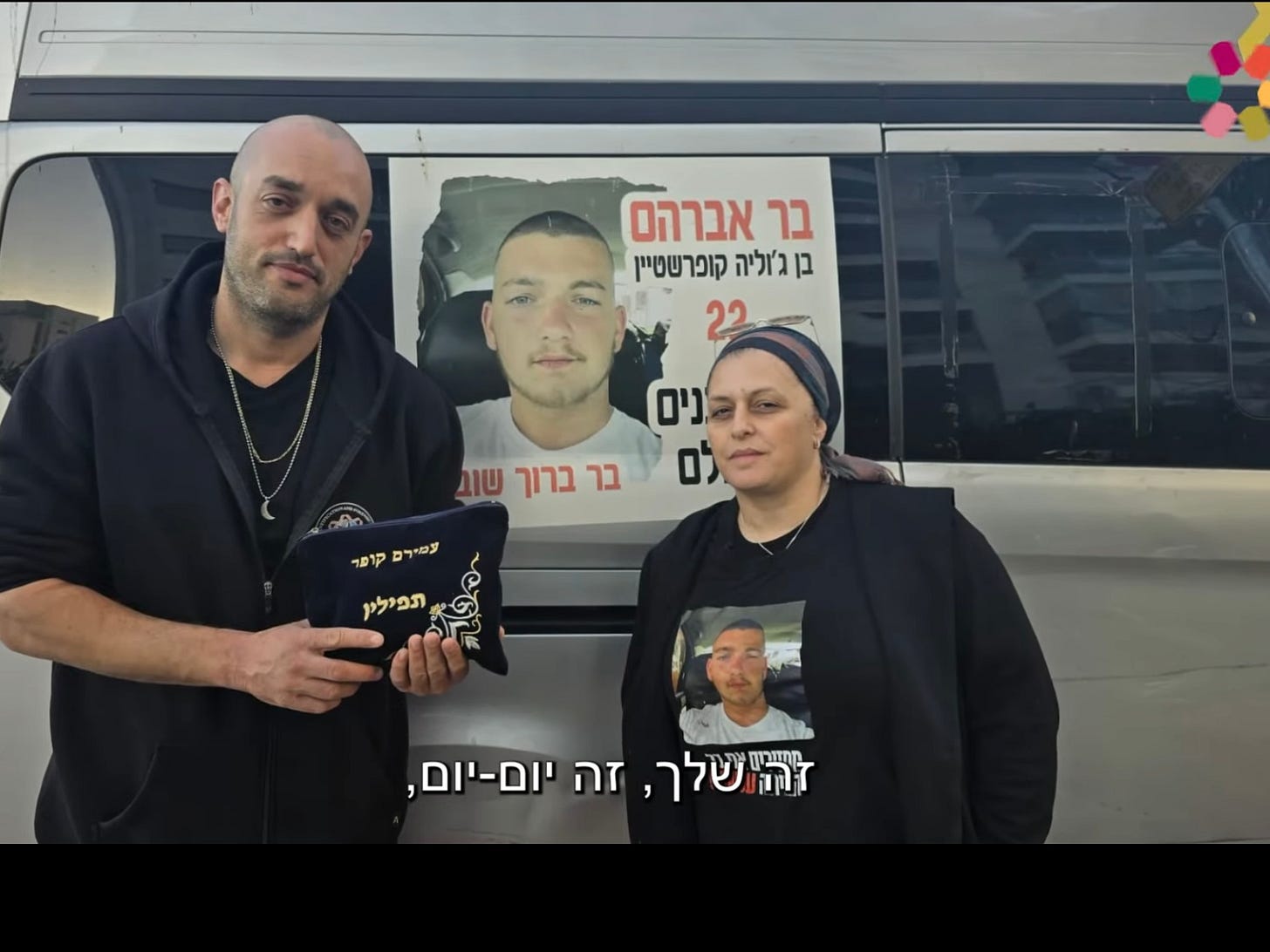The Mother of a Hostage
Julia said to the terrorist on the phone, “My son is not in your hands…”
This is an interview with Julia Kuperstein, mother of Bar Kuperstein, a hostage in Gaza. Riki Siton, the director of Ayelet HaShachar is participating in the interview. Ayelet HaShachar is an organization which builds bridges between the religious and the secular in Israeli society. I have put together some particularly moving snippets of their conversation. Some of the wording and grammar have been changed for brevity and clarity. So without further ado...
Julia: At the beginning, when we understood that Bar was kidnapped, there were terribly difficult days. We learned about it on October 7th. I tried to figure out what to do. Naturally, I cried and cried…and prayed…trying to know how to move forward.
Then I decided to go out of the house…to help myself and help others. [I have ] five children, one in captivity, and my husband, who is disabled…not at all simple.
So I decided to go out. I remember the day as if it was today. It was the Yarzeit of Rachel Imeinu [the Matriarch Rachel’s date of death]. They invited us to a press conference at “Hostage Square”. I’m not into this at all…I just wanted to meet other families who were coping with the same thing.
Bar had called me on that Friday…a sweet boy who calls his mother to say, ‘Shabbat Shalom’ and ‘Chag Sameach’. He was at work. He is a lieutenant colonel . He is responsible for 75 security officers.
He told me, ‘Eema, I’m not traveling in a car on Shabbat [Julia explains that she became religious 14 years ago]. And sweet Bar, an amazing child—it was difficult for him to keep Shabbat because he so much wanted to help us after my husband’s accident. He worked. I would speak to him about Shabbat, and how Shabbat guards and protects us. We had many discussions about this. But for a long time I hadn’t spoken to him about that. I simply let go.
Riki: After Tal’s [her husband] accident—Tal is disabled, and Bar is the only one who supports the house. He is simply a responsible child. It’s not because he makes money to have a good time. He works to support a house with five children, while Julia takes care of her husband.
Julia: He told me, ‘Eema, this Shabbat, I am not going to travel’. We hadn’t spoken in a long time about that subject…so he said, ‘They gave us a place to stay here, so I’m not going to drive.’ I was happy to hear…that it came from him, that I didn’t prod or bother him about it. It was such a positive discussion. And that was our last one…
Riki: Actually, that day made sense for a boy who had taken on a lot of responsibility, even before he turned 17.
In the livestream that Hamas advertised—30 seconds—we can understand who this boy is, because there are five hostages on the floor, and one is Bar. The camera spans and we see Bar, lying on his stomach on the ground, hands tied behind his back. He raises his head… and what does this boy shout in this most terrifying moment, the most degrading moment in his life, what does he shout? You know what he shouts?
‘Take care of him! Take care of him!’ He was shouting about Elkana Buchbot, another hostage, who was wounded. Bar is a medic. And even when his hands are tied, he is still a medic!’
Julia: On Sunday, right afterwards, his friend Dean came to see us. He succeeded in running away, thank G-d. He told me about all the terrible things that happened there. They began taking care of the wounded.
They understood that they are in danger themselves, that they have to save themselves. Dean came to Bar with the Ranger Jeep and shouted, ‘Come on! Let’s get away!’
Bar got angry with him, ‘You want to run, go ahead! I’m staying. There are wounded people here!’
Riki: But you know, it’s no wonder. Bar’s father was on his way to resuscitate a little girl when he himself was in the accident. He was a paramedic. Also Julia is a medic. Before Tal’s accident, their main ‘recreation’ as a couple was to save lives! That’s what Bar chose to be. That’s his essence. So it’s no wonder.
Julia: I felt that after our last discussion, mine and Bar’s, it’s the Shabbat that will bring him back.
So Riki recorded me. Maybe 20 seconds …I asked Am Yisrael, not necessarily to keep [all of] Shabbat, but that they should take on a significant part of Shabbat, for Bar’s sake. For Bar, and for all the hostages, to bring them home faster.
It was amazing. We received more than 3000 inquiries from Am Yisrael.
Riki: Someone called me [soon after October 7th], and said to me, ‘Where are you, the Chareidim? There are hostages. Did you hear that there are 251 hostages? So where are you?’
The next day, I took a friend…and we came to the headquarters, where the families are. I was nervous. It was a very left-wing, secular place, and I also didn’t know if they would appreciate Chareidim walking around at this moment of not knowing. And mostly, I didn’t know what to say.
When I met Julia, I met someone who is focused on doing something. At first it was just crying- two hours of crying. When I came home…we put his picture up immediately in our living room, even the little kids know how to say ‘Bar Avraham Ben Julia’ [to pray for him].
Julia: I am the mother of a hostage, but I’m also a representative of a different sector. When I came to the headquarters, I really didn’t find my place. I look different, ok? Riki fought for the Prayer Tent to be put up there, which was really important. A place for us to be, to pray, to do…today I think it is the heart of the Hostage Square. We have events there and tefilot (prayers). There is a Kollel Erev [people studying Torah] every evening, the Kollel of Ayelet HaShachar.
At first they told us, ‘go into the museum’. We said, ‘No, we don’t want to go there. We want to be here, as families of hostages!’
Every Tuesday there are gatherings. Also the Saturday nights…thousands come every week—the secular, religious, and Chareidim- they pray, they listen to the families. We give out huge pots of soup on Saturday nights, and then they sing “HaTikvah”, and we go into the tent. And there is a different kind of “Tikvah” [which means hope].
We received a pair of tefillin1 from a friend. We said, let’s give it to someone…to someone who hasn’t put on tefillin until today. We sent out an announcement:
‘Hello, I’m Bar’s mother. Bar is a hostage in Gaza, and I am asking for someone to put on tefillin because right now he’s a captive, and he can’t lay tefillin.’ We put Riki’s telephone number on there.
We couldn’t believe what a flood of calls she got! We thought maybe five or ten people would call. We got more than 90 calls! It was crazy! One 17 year old boy from the school in Herzelia, an 89 year old Holocaust survivor who hadn’t put on tefillin since then, another person who was wounded in Gaza. Someone who said, ‘I’m a lawyer, secular, don’t keep Shabbat. I’m ready to come down to the Promenade in Tel Aviv every day to put tefillin on other people…’ he was a good “nudnik”, he didn’t give up.
Riki: So what do you do? Then Julia said, ‘There are so many people who want to put on tefillin, let’s put them together! Let’s not leave anyone behind.’ So we opened an Excel, we put all the volunteers in, and all the names of the hostages. We had only one pair of tefillin so we said, ‘OK, we’ll find everyone a pair!’
Now you should know, that Holocaust survivor put on tefillin for Shlomo Mansour, H”YD, the hostage from Kisuffim who was 86. Every volunteer had the name of an hostage, and they put on tefillin every single day. Each person signed an agreement and received a picture of the hostage. They got a bag with the hostage’s name on it.
This tefillin is for Eli Sharabi [who was returned]. Sadly, his brother’s body is still in Gaza.
For Sasha, who was returned in the last group of hostages
Twin brothers put on tefillin for twin brothers.
For Amiran Kuper, whose body is still in Gaza
Riki: There is a ‘Bar tefillin’ [a tefillin stand] at Hostage Square. Then we started to make a tefillin stand for every hostage. Where? In a place that is connected to him. For example, Elkanah Buchbot- Elkanah Ben Ruchama—in his ice cream stand in the Carmel Shul! There’s no ice cream until he gets back, but there is tefillin.
And every Thursday we do hafrashat challah2 in the tent for a different hostage.
One secular journalist said, “I don’t understand. In the tent there is optimism.” Yes, there is optimism. There is hope. It’s not a contradiction…there is also the pain and the worry… someone watching this might think, ‘maybe Julia doesn’t completely understand’….she understands! She is 200 percent inside of the situation. She worries, and she is waiting and yearning on a level that we can never understand. She was speaking about Bar, and praying, and she fainted!
But the joy on her face is not something you could miss when the mothers got their [hostage] daughters back. It’s Julia’s true joy. And of course we are waiting for the happiness that will also be ours.
Julia: One morning when I was at Riki’s. I got a phone call. Someone who identified himself as a Hamas terrorist. He had a Persian [Iranian] accent. At the beginning, I didn’t really understand…I really didn’t understand what this was about, and how he got to me.
And then he started threatening me. ‘You want to see you son Bar again?’
Then I went down and I called Riki, ‘Riki, come here quick!’ I put him on speaker. So we were on the call together.
So he started threatening me, saying, ‘You have to go to the protests, and complain,. Go to The Hague, complain about Israel, that they’re killing the children in Gaza.’
Riki: He actually blamed you. He said, ‘You, the families of the hostages, have a lot of power in Israeli society. And you, you’re not doing enough for your son.’ Because Julia is not so much in the media, at the protests, and in politics.
Julia: For a moment I was scared. But then I said, ‘You know, my son Bar is not in your hands. He’s in the hands of G-d. You too are in the hands of the Creator.’
Riki: there was quiet on the line. The terrorist was confused. He tried to frighten her- it’s terror, psychological war- he didn’t expect this. Then the terrorist said to her, ‘Kol Hakavod, giveret—[roughly translated as, ‘You get a lot of credit, lady.’]
Julia: I choose to do real action. I choose to do business (make deals) with the Creator. Really, I believe this. I think that what will bring them back is prayer, prayer, prayer. And lots of merits (mitzvot).
Please pray for my son, Bar Avraham Ben Julia, and the rest of the hostages, of course. Don’t stop praying until they come home, with Hashem’s help. And I think everything, every small thing that you can do, it will make a great noise in Shamayim [up Above] and bring them home. Maybe a study partner, a chevruta, to learn more about Judaism. I had a chevruta from the beginning, and it was an anchor and a light for me in the world of darkness that had enveloped me. And please, don’t stop praying.
Riki: We don’t think we can do big things. It doesn’t matter. Just do something. Don’t say, ‘Who am I? What can I do?’ There are people who are more than 470 days [now more than 500] who still are not home. We can’t stop for a moment. And every one of us can do something, something small, to be able to say, ‘I did what I could to bring them back’.
Bar Avraham Ben Julia, and all the rest, should come back soon, safe and healthy.
Phylacteries. https://www.chabad.org/library/article_cdo/aid/4455097/jewish/14-Tefillin-Facts-Every-Jew-Should-Know.htm
Ritually separating a part of the bread dough








Huge! Hatzlacha!
Never underestimate the spiritual power of Jewish women who are on a higher spiritual level than men